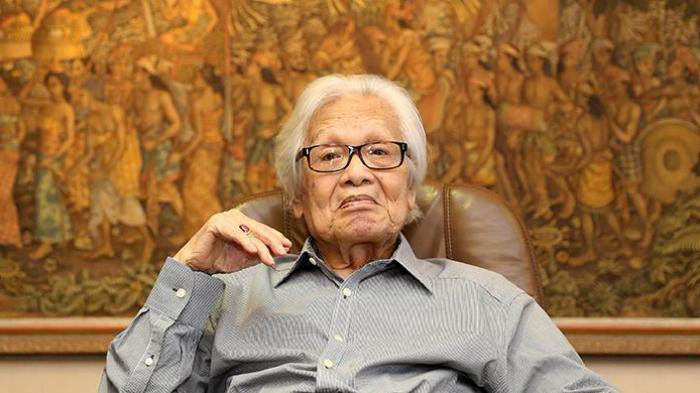Popular Reads
Top Results
Can't find what you're looking for?
View all search resultsPopular Reads
Top Results
Can't find what you're looking for?
View all search resultsJakob Oetama bids farewell, leaving journalism legacy
Change text size
Gift Premium Articles
to Anyone
I
ndonesia lost one of its journalism heroes on Wednesday through the passing of Jakob Oetama, cofounder of the country’s largest media and publishing company, Kompas Gramedia.
Kompas Gramedia confirmed his death. He passed away at the age of 88 after suffering from multiple organ failure, one of the doctors who treated Jakob said. He would be buried at the Kalibata Heroes Cemetery in South Jakarta on Thursday.
Throughout his life, Jakob was known by many of his comrades and loved ones as a simple figure who always prioritized honesty, integrity, gratitude and humanism.
Jakob, the son of a teacher, was born in Jowahan village in Central Java and graduated from the Seminary High School in Yogyakarta in 1951.
Before jumping into journalism, Jakob followed his parents’ footsteps and taught at Mardi Yuana Junior High School in Cipanas, West Java, in 1952 and Van Lith Junior High School in Jakarta in 1953.
It was not until 1955 when Jakob became the weekly editor of Penabur magazine that he began to delve into the publishing world. Six years later, he finished studying at Yogyakarta’s Gadjah Mada University, majoring in mass communication.
He partnered with Auw Jong Peng Koen, or Petrus Kanisius Ojong — one of Indonesia’s active figures in journalism and politics — to publish Intisari magazine, which paved the way for the establishment of Kompas newspaper in 1965.
Now, he should be remembered as the "the nation's teacher", said Jusuf Wanandi, the president director of The Jakarta Post's publishing company, on Wednesday.
“He is an educator for the public, especially through his mixed media and his bookstore, which were services that he provided to the nation as its teacher,” Jusuf said.
Jusuf, who had known him since the 1960s, saw Jacob as an “empathetic and open-minded” individual that had provided “a great service” to the democratic changes in the past.
And he is not alone in holding such views. The Post’s senior editor, Endy Bayuni, acclaimed how Kompas, through the journalism style that Jakob developed, was able to be critical yet survive and thrive under the New Order regime when press freedom was very limited.
“He had the wisdom by which he was able to build the trust of both the people and the elite,” Endy said.
One of Jakob’s pupils, seasoned Kompas journalist Maria Hartiningsih, described the “Kompas journalism” founded by Jakob as expressing criticism without attacking or cornering the subject and giving a voice to the downtrodden.
“I remember he told me to always nurture humanity and compassion, because that’s the most important thing in journalism,” Maria told the Post.
“Through his subtle and sophisticated way of criticizing, we’re also reminded that journalism is a matter of putting issues into context, so that people will know what the problems are,” said Maria, adding that Jakob was a “spiritual father” to her and many Kompas employees.
During a 2005 interview with the Post, Jakob admitted that Kompas’ style, which was not straightforward, possibly arose from his Javanese background.
“From childhood, Javanese people do not ask for money directly but often explain the reasons first,” he said.
Meanwhile, Antara president director Meidyatama Suryodiningrat saw him as a national figure who had been “carrying the torch” for good journalism.
“In an era where the media has to move quickly and seek profit, he still prioritized journalistic values, and that is where young people like us can learn a lot from him,” he said on Wednesday.
Among the young generation, West Java-based Kompas journalist Melati Mewangi said even though she had never talked to Jakob, she had learned a lot about him and his values through his writings as well as his biography.
“There’s nothing new under the sun, Jakob would often say, explaining that there’s nothing new in this world, but that we can always renew our perspectives,” she said.
“He wanted to encourage young journalists to explore the world outside of our comfort zones, and that really helped me shift my perspective when I was assigned to report from a new region that I had never been to. His wisdom lifted my spirit and curiosity,” she said.
Another Kompas journalist based in North Sulawesi, Kristian Oka Prasetyadi, also said he had been holding on to Jakob’s principle of “comforting the poor, reminding the prosperous” in the way he wrote his articles.
Media organizations have conveyed their condolences and appreciation for Jacob’s contribution to the country.
Press Council head Muhammad Nuh said Jakob had paid close attention to media regeneration, citing as an example the fact that his company had founded Multimedia Nusantara University (UMN).
Alliance of Independent Journalists (AJI) chairman Abdul Manan also recalled how Jakob once congratulated then-AJI chairman Lukas Luwarso for the AJI’s persistence in fighting against the government’s repression of press freedom.
“I think that reflects his attitude as a gentleman who respected the younger generation,” Abdul said.
Meanwhile, Indonesian Journalists Association (PWI) head Atal S. Depari said he was considering creating an award under Jakob’s name to honor his legacy, which would be given to journalists who write about humanities.










